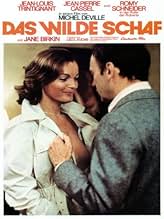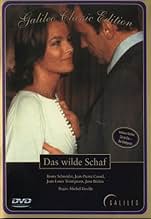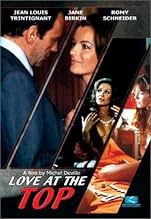IMDb रेटिंग
6.7/10
2.2 हज़ार
आपकी रेटिंग
अपनी भाषा में प्लॉट जोड़ेंA cynical tragicomedy focusing on the different ways of love in the times of the sexual revolution.A cynical tragicomedy focusing on the different ways of love in the times of the sexual revolution.A cynical tragicomedy focusing on the different ways of love in the times of the sexual revolution.
- निर्देशक
- लेखक
- स्टार
फ़ीचर्ड समीक्षाएं
Nicolas Mallet is a failure. A teller in a bank, everyone walks all over him. Then his friend, a writer who's books no one likes, has a plan to change his life. Our hero tells his boss he is quitting. He intends to spend the rest of his life making a great deal of money and sleeping with a great many women. And he manages to do just that.
If it were not for the amount of death (murder/suicide/natural causes) in the film, this would be a farce. There are numerous jabs at marriage, politics, journalism and...life.
Jean-Louis Trintignant is a likable amoral rogue. Romy Schneider is at her most appealing. Definitely worth a look.
If it were not for the amount of death (murder/suicide/natural causes) in the film, this would be a farce. There are numerous jabs at marriage, politics, journalism and...life.
Jean-Louis Trintignant is a likable amoral rogue. Romy Schneider is at her most appealing. Definitely worth a look.
A so French satirical drama, or comedy drama, and played by the perfect cast of actors. Jean-Louis Trintignant and Romy Schneider are here not as good as in LE TRAIN, made the very same year, but this movie is a perfect testimony of this seventies period. Jean-Louis Trintignant is delightful of cynicism, selfishness, as a cool ruthless man. This film, I repeat, is a satyre of social rise during this period. Keep in mind that the seventies was a period that we never knew after. Greed was smooth, ambition was fun, and we could speak about that, show this without any restriction, with a bit of humor. Foreign audiences will probably understand nothing to it.
Michel Deville quietly left us and this world a few weeks ago, and his disappearance would have gone unnoticed, for me at least, if some television stations had not marked the sad event by programming some of his films. A contemporary and colleague of the formidable New Wave generation, Deville was an interesting and quite prolific director. Somewhat more conservatory in style than his more famous colleagues, he was bolder in his choice of themes, making (and sometimes writing) films about unusual relationships between men and women, set in social environments where corruption and ambiguity are rule. He was also considered an excellent 'director of actors', so that the names of most of the famous French actresses and actors of the eras in which he created appear on the credits of his films. 'Le Mouton enragé' (the English distribution title is 'Love at the Top'), released in 1974, is one such example. I chose to see the film for its formidable cast, and I discovered an interesting movie, a story of social ascension through unusual means that could not have been brought to the screen in this way today, and which, if ever a 'remake' is made, will look completely different.
Nicolas Mallet is a bank clerk dressed in gray suits and wearing bland ties. Shy and uninteresting, he allows himself to be manipulated by his friend Claude Fabre, a failed writer who lives off private French grammar lessons given in bistros. A kind of puppet manipulated into deeds and adventures far different from his psychological profile. At Claude's prompting, Nicolas enters into relationships with very different women, then with politicians, leaves his stable job to become an intermediary in politics (today we would call him a lobbyist) and in dubious dealings at an increasingly higher levels. The fun thing is that the scheme succeeds beyond all expectations. The marionette proves to be a talented lover, the women he conquers are gorgeous and the politicians he supports are elected to Parliament. For the manipulator Claude the only reward seems to be the detailed accounts that Nicolas gives about his adventures. Any pyramid business, however, risks eventually collapsing.
In the story taken from Roger Blondel's novel, the separation between the roles of men and women in relationships is one that would not be accepted in today's movies. Nicolas, behind his shyness, is almost a predator seducer and the women who meet him seem to easily become his victims. But is that really how things are? The three women that Nicolas (played by Jean-Louis Trintignant) meets are very different from each other. Marie-Paule (Jane Birkin at the peak of her youth and beauty) may be a prostitute, but she is sincerely in love. Roberte (Romy Schneider in one of her most sensual roles) is looking for an escape from a boring marriage and knows her interests well, even if they fall outside the social norms. Finally, Flora (Florinda Bolkan) manages her relationships in a calculated way and does not lend herself to the role of victim at all. Behind all these social intrigues played with the tools of love is Claude, played by Jean-Pierre Cassel, who today we almost automatically call 'the father of ...', but who was himself a formidable actor. Seeing him in this film we understand where the son inherited his talent but also the look of the man who knows much more than he says. 'Le Mouton enragé' is a film that must be seen without prejudice and especially not through the lens of the cinematic moralism of 2023. It is not Michel Deville's best film, and precisely because of this it is proof that he was a director whose name must neither be forgotten nor ignored.
Nicolas Mallet is a bank clerk dressed in gray suits and wearing bland ties. Shy and uninteresting, he allows himself to be manipulated by his friend Claude Fabre, a failed writer who lives off private French grammar lessons given in bistros. A kind of puppet manipulated into deeds and adventures far different from his psychological profile. At Claude's prompting, Nicolas enters into relationships with very different women, then with politicians, leaves his stable job to become an intermediary in politics (today we would call him a lobbyist) and in dubious dealings at an increasingly higher levels. The fun thing is that the scheme succeeds beyond all expectations. The marionette proves to be a talented lover, the women he conquers are gorgeous and the politicians he supports are elected to Parliament. For the manipulator Claude the only reward seems to be the detailed accounts that Nicolas gives about his adventures. Any pyramid business, however, risks eventually collapsing.
In the story taken from Roger Blondel's novel, the separation between the roles of men and women in relationships is one that would not be accepted in today's movies. Nicolas, behind his shyness, is almost a predator seducer and the women who meet him seem to easily become his victims. But is that really how things are? The three women that Nicolas (played by Jean-Louis Trintignant) meets are very different from each other. Marie-Paule (Jane Birkin at the peak of her youth and beauty) may be a prostitute, but she is sincerely in love. Roberte (Romy Schneider in one of her most sensual roles) is looking for an escape from a boring marriage and knows her interests well, even if they fall outside the social norms. Finally, Flora (Florinda Bolkan) manages her relationships in a calculated way and does not lend herself to the role of victim at all. Behind all these social intrigues played with the tools of love is Claude, played by Jean-Pierre Cassel, who today we almost automatically call 'the father of ...', but who was himself a formidable actor. Seeing him in this film we understand where the son inherited his talent but also the look of the man who knows much more than he says. 'Le Mouton enragé' is a film that must be seen without prejudice and especially not through the lens of the cinematic moralism of 2023. It is not Michel Deville's best film, and precisely because of this it is proof that he was a director whose name must neither be forgotten nor ignored.
A middle-age man (Jean-Louis Tritignant) picks up a pretty young woman (Jane Birkin). When he finds out she's a prostitute, he slaps her into submissiveness and then "rapes" her. She ends up adoring him for it, and he discovers his strange powers over beautiful women.Encouraged by his scheming friend (Jean-Pierre Cassel), a crippled, unsuccessful writer, he uses his seductive powers to seduce the wife of a business associate (Romy Schneider), and embarks on a campaign of shady land deals and political intrigue.
This movie works best if you take it as a satire or absurdist comedy. The character's strange power over incredibly beautiful woman is especially ludicrous. Most men would volunteer their left testicle to sleep with Jane Birkin and their right one to sleep with Romy Schneider; they would then be left castratti if they went on to seduce the likes of Florinda Bolkan (as a bisexual political power broker)and Estelle Blain (as a vapid movie star) as Tritigant's character does here. In one of the funniest scenes, the hero has to, in order to close a deal, either sleep with a wealthy woman who is "older than God" or marry an 18-year-old heiress. Hilariously, the young girl is eager to jump into bed with him, but refuses to consider marriage, so he has to make the ultimate sacrifice.
This is definitely a very black comedy which takes a lot of tragic and violent turns at the end, but in typical French (i.e. decidedly non-Hollywood)fashion it refuses to provide a tidy moral at the end or make its hero too sympathetic. As for the literal translation of the French title, "The Angry Sheep", I'm still trying to figure that one out.
This movie works best if you take it as a satire or absurdist comedy. The character's strange power over incredibly beautiful woman is especially ludicrous. Most men would volunteer their left testicle to sleep with Jane Birkin and their right one to sleep with Romy Schneider; they would then be left castratti if they went on to seduce the likes of Florinda Bolkan (as a bisexual political power broker)and Estelle Blain (as a vapid movie star) as Tritigant's character does here. In one of the funniest scenes, the hero has to, in order to close a deal, either sleep with a wealthy woman who is "older than God" or marry an 18-year-old heiress. Hilariously, the young girl is eager to jump into bed with him, but refuses to consider marriage, so he has to make the ultimate sacrifice.
This is definitely a very black comedy which takes a lot of tragic and violent turns at the end, but in typical French (i.e. decidedly non-Hollywood)fashion it refuses to provide a tidy moral at the end or make its hero too sympathetic. As for the literal translation of the French title, "The Angry Sheep", I'm still trying to figure that one out.
As the title of Michel Deville's film translates as the singularly uninviting 'The Rabid Sheep', there have naturally been a few alternatives, the most inappropriate of which must surely be 'Love at the Top'. Whoever thought that one up might perhaps have had in mind the earlier 'Room at the Top' and its sequel but Laurence Harvey's social climber Joe Lampton is a positive milquetoast compared to the Nicholas Mallet of Jean-Louis Trintignant. Monsieur Trintignant utilises his innate shyness and natural charm to great effect here so as to make his character less loathsome.
This film is the first of Deville's loosely connected trilogy that was to continue with the dark and disturbing 'Eaux Profondes' and culminate in his most accomplished, critically acclaimed and commercially successful 'Péril en la Demeure'. Of the three it is the most scathing and cynical and for this viewer at any rate, the weakest.
Trintignant's character is a latter day Bel Ami and the women he beds show precious little resistance, notably the enchanting nymphet of Jane Birkin who becomes remarkably docile after being clipped round the chops by our hero, gorgeous Romy Schneider's bored wife who pays the ultimate price for her infidelity, cougar Florinda Bolkan who paddles with both feet and septuagenerian Mary Marquet!
By far the most fascinating character and one that supplies the film's darkest element is the crippled writer Claude of Jean-Pierre Cassel, a near devilish personality who guides Nicholas on his way to sexual and financial success as well as living a life by proxy as he obviously covets his protegé's conquests. An astute critic has observed that Cassel and Trintignant could so easily have swapped roles.
Deville's preferred editor Raymonde Guyot guarantees a brisk pace whilst the excellent use of the music of Saint-Saens, notably his Third Symphony, reminds us that he is credited with writing the first film score for 'L'Assassinat du Duke de Guise' in 1908.
Is there a moral to the tale? 'Be careful what you wish for....' would seem the most apt.
This film is the first of Deville's loosely connected trilogy that was to continue with the dark and disturbing 'Eaux Profondes' and culminate in his most accomplished, critically acclaimed and commercially successful 'Péril en la Demeure'. Of the three it is the most scathing and cynical and for this viewer at any rate, the weakest.
Trintignant's character is a latter day Bel Ami and the women he beds show precious little resistance, notably the enchanting nymphet of Jane Birkin who becomes remarkably docile after being clipped round the chops by our hero, gorgeous Romy Schneider's bored wife who pays the ultimate price for her infidelity, cougar Florinda Bolkan who paddles with both feet and septuagenerian Mary Marquet!
By far the most fascinating character and one that supplies the film's darkest element is the crippled writer Claude of Jean-Pierre Cassel, a near devilish personality who guides Nicholas on his way to sexual and financial success as well as living a life by proxy as he obviously covets his protegé's conquests. An astute critic has observed that Cassel and Trintignant could so easily have swapped roles.
Deville's preferred editor Raymonde Guyot guarantees a brisk pace whilst the excellent use of the music of Saint-Saens, notably his Third Symphony, reminds us that he is credited with writing the first film score for 'L'Assassinat du Duke de Guise' in 1908.
Is there a moral to the tale? 'Be careful what you wish for....' would seem the most apt.
क्या आपको पता है
- ट्रिवियाJane Birkin said she asked Jean-Louis Trintignant to hit her for real in a scene. "My first scene was rather difficult: I was naked in front of Trintignant in the hotel room. Moreover, in the script, it was written that he was kissing my breasts. I thought: My God, he has fallen badly! I was ashamed. Only one thing helped me: he had to slap me and make me fall on the floor. Now, when you get a slap on the mouth, your mouth becomes like cotton when you say the next lines. I had to say, 'You have a little bike in your head'. My mouth hurt and I said it in a cottony way. Unfortunately, we had to double the scene because of the camera noise, and I couldn't do it as well. I would have had to get a grip on myself! Today, I wouldn't hesitate to do it. Trintignant was nice, he didn't want to hurt me. I wanted him to hurt me, I begged him to hit me," Birkin recalled.
- कनेक्शनReferenced in L'ultimo treno della notte (1975)
टॉप पसंद
रेटिंग देने के लिए साइन-इन करें और वैयक्तिकृत सुझावों के लिए वॉचलिस्ट करें
- How long is Love at the Top?Alexa द्वारा संचालित
विवरण
- रिलीज़ की तारीख़
- कंट्री ऑफ़ ओरिजिन
- भाषा
- इस रूप में भी जाना जाता है
- Love at the Top
- फ़िल्माने की जगहें
- Jardin des Batignolles, Paris 17, पेरिस, फ़्रांस(park where Nicolas meets Marie-Paule)
- उत्पादन कंपनियां
- IMDbPro पर और कंपनी क्रेडिट देखें
- चलने की अवधि1 घंटा 45 मिनट
- ध्वनि मिश्रण
- पक्ष अनुपात
- 1.66 : 1
इस पेज में योगदान दें
किसी बदलाव का सुझाव दें या अनुपलब्ध कॉन्टेंट जोड़ें
































